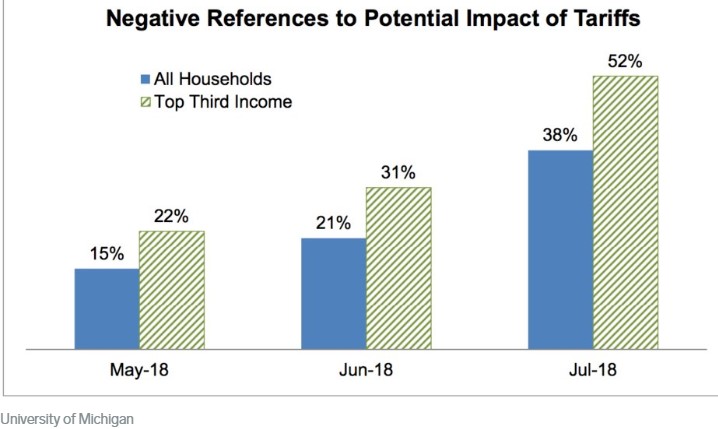Starting out at 15 percent in May, the number of U.S. consumers who are concerned about the Trump Administration’s trade policy increased to 21 percent in June and, now, 38 percent in July, according to a University of Michigan consumer survey.

(Click to enlarge)
But it’s also worth noting that while consumer sentiment dropped into further negative territory in July, it’s still pretty much equal to the average over the past 12 months, and even since the start of 2017.
Why? Because overall, Americans see “favorable job and income prospects”, according to the UofM survey, “with consumers under age 45 anticipating the largest income gains since July 2000”.
So while negative concerns about the trade war are accelerating, the level of fear is being subdued by other factors—for now.
And the biggest share of fear seems to be coming from the top one-third of the income distribution. In other words, according to UofM, those who account for half of consumer spending. In fact, 52 percent of this group expressed a negative sentiment about the Administration’s trade policy in July. They’re concerned about a “decline in the future pace of economic growth and an uptick in inflation”, the survey noted.
The survey also notes what “while consumers may not understand the intricacies of trade theory, they have substantial experience making decisions about the timing of discretionary purchases based on prospective trends in prices”.
For now, the daily lives of the average American have remained unchanged. But that is, of course, not true for everyone--particularly for soybean farmers.
Related: Bezos’ Space Flight Gamble
The U.S. is China's second-biggest source of soybeans, accounting from some 34 percent of imports, according to Reuters, after Brazil, which ships 53 percent of China’s soybean needs. Following Beijing’s retaliatory tariff measures, some soybeans farmers are already near bankruptcy.
According to the National Retail Federation (NRF), U.S. tariffs on $34 billion in Chinese goods, which took effect on July 6th, will have a negative impact on jobs and costs of living.
“We strongly urge the administration to abandon its plans for tariffs on another $200 billion in Chinese imports, which would destroy thousands of American jobs and raise prices on virtually everything sold in our stores. Reining in China’s abusive trade policies is a goal shared by many countries, but a strategy based on unilateral tariffs is the wrong approach and it has to stop," the NRF said.
The federation also warned that “tariffs will push prices higher for tool sets, batteries, remote controls, flash drives and thermostats, refrigerator… .”
U.S. Chamber of Commerce President and CEO Thomas J. Donohue's echoes those sentiments, saying: “Tariffs are beginning to take a toll on American businesses, workers, farmers and consumers as overseas markets close to American-made products and prices increase here at home. Tariffs are simply taxes that raise prices for everyone."
And the list of goods whose prices have already increased or will shortly is rather large and includes, for starters:
• Everyday consumer goods
• Housing
• Washing machines
• Common electronics
• Your Chick-fil-A sandwich
• Cars
• Harley-Davidson motorcycles
• Farm products
But even this has become a highly polarized debate.
Related: The Real Winners Of The Real Estate Business
While the Chamber of Commerce and other federations and associations are sounding the alarm bell, Federal Reserve officials are offering up a largely optimistic view that doesn’t see nearly as much risk to growth from trade tensions, and paints a picture of a financial system that is highly resilient.
Economic activity, says the Fed, increased at a solid pace and the labor market is still getting stronger, even though earnings for most American workers haven’t risen this year as expected.
Right now, the Fed seems to be more worried about high oil prices, which it says have cost Americans an average of $300 a year more at the pump.
By Damir Kaletovic for Safehaven.com
More Top Reads From Safehaven.com:
















